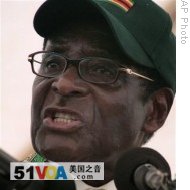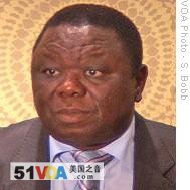Johannesburg
16 January 2009
A senior Zimbabwean official says he is pleased that Prime Minister-designate Morgan Tsvangirai is returning home for talks with President Robert Mugabe on reviving the stalled efforts to form a unity government. The reaction comes after the South African government announced that President Kgalema Motlanthe would go to Harare Monday to mediate between the two rivals.
Zimbabwe's Deputy Minister of Information, Bright Matonga, Friday welcomed the return of Morgan Tsvangirai to Zimbabwe after a two-month absence.
 |
| Zimbabwe President Robert Mugabe speaks at his ZANU PF's 10th annual Congress in Bindura, Zimbabwe, 19 Dec 2008 |
"What is very important now is to put the people of Zimbabwe first," said Matonga. "Yes, there is suffering. There is hunger. It's high time that our leaders sit down and make a way forward, make a way forward that is not selfish but to the benefit of everybody."
The South African government earlier announced that President Kgalema Motlanthe (as head of the Southern African Development Community) would go to Harare to mediate the talks.
Tsvangirai announced Thursday that he was returning to Zimbabwe on Saturday for talks due early next week. But the veteran opposition leader gave conditions that laws governing the security forces and the powers of the president and prime minister must be enacted first and the arrests and torture of his supporters must stop.
Mr. Mugabe, Tsvangirai and the head of a smaller opposition party Arthur Mutambara four months ago signed a global political agreement aimed at forming a government of national unity. The new government was to end a political standoff that followed disputed elections last year.
But implementation of the accord has stalled over the allocation of ministries and other disputes.
 |
| Morgan Tsvangirai speaking to reporters in Johannesburg, 15 Jan 2009 |
"Since we are committed to this global political agreement we have to have a partner," said Tsvangirai. "Unfortunately I don't have a credible partner on the part of Mugabe. But we have to deal with him in terms of the outline of that global political agreement. It doesn't mean necessarily that I trust him wholly [completely]."
The developments came as a leading human rights activist, Jestina Mukoko, appeared in a Zimbabwean court pleading to be allowed to see her doctor more than three weeks after being taken from her home and beaten by unidentified men.
 |
| Zimbabwean human rights activist Jestina Mukoko arrives at magistrate's court in Harare, 24 Dec 2008 |
Government spokesman Matonga said such issues could be resolved once a new government was formed.
"This business of abductions or whatever, torture, it's not going to resolve anything. What is important now is to form that government," he said. "Once you form that government, government can then sit down and investigate those things."
The government has accused members of Tsvangirai's Movement for Democratic Change of recruiting young men for military training in neighboring Botswana. Tsvangirai and the Botswana government deny the charge.